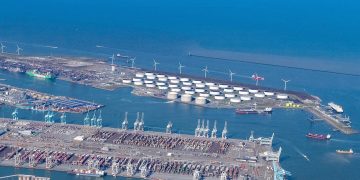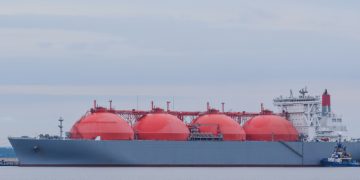Sustainable shipping should be part of organizations’ corporate strategy; it recommends beneficial actions for various stakeholders that the organization relates with by achieving simultaneously financial, social and environmental benefits. Overall, these actions aim at the improvement of the competitiveness of the organization. The following examples describe good practices and successful cases of sustainable shipping implementation in the industry.
Maersk Group: New diversity and inclusion strategy approved in 2017
In 2017, the A.P. Møller – Mærsk A/S Board of Directors consisted of 11 members, of which 3 are women (12 members and 3 women in 2016). The Board set a target in 2015 to be reached by the latest in 2019: three female Board members elected by the Annual General Meeting if the Board consists of less than twelve members. Four female Board members if the Board consists of twelve or more members. The target was reached in 2017 due to the decrease in the number of total Board members from 12 to 11 with 3 female Board members.
With a new diversity and inclusion strategy approved in 2017, Maersk is devoting more of its resources to these dimensions going forward. They have defined leadership and local ownership, unconscious bias and inclusion capability building as well as communication as their three priorities through 2018. To support the measurement of progress in achieving gender and nationality diversity ambitions, Maersk has revised targets to be more ambitious and aligned to the new organisational structure.
Mitsui OSK Lines: Implementing the ‘Rolling Plan 2017’
The MOL Group has expressed its basic stance toward corporate social responsibility (CSR) in the MOL Group Corporate Principles. Based on the corporate principles, the group aims to foster a corporate group that grows sustainably in harmony with society with CSR at its foundation. In April 2017, MOL established the new management plan “Rolling Plan 2017”. According to the plan, in ten years from now (2027) the group is about to
- provide stress-free services that are truly convenient worldwide
- develop the environment and emission-free businesses into one of its future core operations
- strategically allocate resources to carefully selected businesses that have a clear competitive edge.
In order to develop the MOL Group into an excellent and resilient organization that leads the world shipping industry the organization will take the following steps:
- Carefully select opportunities for new investments and pursue business models focused on cash flow
- Prioritize resources to develop and defend business fields
- Group-wide priorities for strengthening the MOL Group
Carnival: Improving water use efficiency
Carnival continues improving water use efficiency of shipboard operations by 5% by 2020 relative to 2010 baseline, as measured by liters per person per day. Over time, Carnival has increased the percentage of water produced on board relative to the total water bunkered, which helps them to reduce the risk associated with disruption of water supplies in the ports of call where ships bunker water. In order to improve water use efficiency, Carnival is taking the following steps
- Guests are encouraged to assist them in their water use efficiency efforts by making them aware of options available on board to conserve water
- Crew is well trained and aware of water efficiency practices
- Systems that are highly dependent on water are continuously replaced with more efficient water management options. (ex. efficient laundry machines and dishwashers)
- Sink aerators and low-flow are installed shower heads in cabins and public areas.
- Water procurement at the ports is determined based on water quality, availability, reliable and abundant supply and cost.
- For the ports that the organization owns and operates, water quality is managed and monitored in accordance with local health requirements and port specific procedures developed based on the U.S. Center of Disease Control Vessel Sanitation Program (VSP) guidelines.
- Water related risks and opportunities are identified by management using a holistic risk framework and a risk management capability model aligned with the organization’s strategy and management priorities.
BP: Security and human rights
BP engages with the security forces that protect the organisation’s facilities to help them understand and respect the human rights of workforce and people living in communities near their operations. BP is a signatory to the Voluntary Principles on Security and Human Rights, which provide a framework for companies to assess whether human rights issues are likely to occur as a result of security activities within local operations, and to allow appropriate precautionary steps to be taken.
- Employees accountable for assessing and managing security receive guidance to help them understand BP’s approach to implementing the Voluntary Principles.
- Internal assessments identify areas where BP can improve implementation (ex. A 2016 review of Tangguh LNG facility in Indonesia identified some training gaps, which was addressed by recruiting a security training lead for the region in 2017.)
- Details of progress on security and human rights issues are included in an annual report to the Voluntary Principles plenary.
- To share and promote best practice, BP works with governments, other companies and non-governmental organizations (NGOs), whether or not they participate in the Voluntary Principles. (ex. NGO International Alert)
Port of Antwerp: The greenest ships are given the greatest incentive
Based on the engine characteristics and the fuel used, the Environmental Ship Index (ESI) evaluates the amounts of NOx, SOx and CO2 emitted by the ships, with a bonus for particularly efficient ships or those with onshore power connectors. The port of Antwerp has been an “incentive provider” since the index was first introduced in 2012; ships with a good environmental score are granted a discount on port dues. Between 2012 and 2016 ships with a score of 31 or more were given a 10% discount. As of 2017 a graduated system is followed, in which ships with a score between 31 and 50 are given a discount of 5%, those with a score between 50 and 70 a discount of 10%, and those with a score of 70 or more a discount of 15. In other words, the greenest ships are given the greatest incentive. Number of calls for which a discount has been granted since 2012:
- 2012: 462 calls
- 2013: 344 calls
- 2014: 501 calls
- 2015: 903 calls
- 2016: 1.137 calls
ICS: Sustainable disposal of ships
ICS is committed to ensuring that governments ratify the IMO Hong Kong Convention on ship recycling as soon as possible. The association with the support of a wide coalition of international shipping industry organisations, continues to promote its expanded Transitional Measures for Shipowners Selling Ships for Recycling, which were published to assist the industry in 2016. Their purpose is to allow shipowners to adhere to the Hong Kong Convention’s requirements, as far as practicably possible, in advance of the full implementation of a legally binding global regime.
Meanwhile, in co-operation with ECSA, ICS is also firmly resisting proposals, developed by consultants for the European Commission, to compel ships to pay for EU ship recycling licenses when calling at EU ports. Under these proposals, the money visiting ships would have to pay into a proposed EU fund, including those flying the flag of non-EU nations, would only be returned at the end of the vessel’s working life, many years later, when it will probably have a different owner, and only then on condition that the ship is recycled at a yard approved by the European Commission.
AMSA: Ensuring workforce engagement, development and safety
Biennial staff engagement survey indicated strong staff satisfaction and engagement relative to public sector averages. Effective leadership, culture and appropriate levels of staff engagement contributes to the achievement of business outcomes. Specifically, a survey was held over due to AMSA being in an organisation restructure. The survey conducted in quarter one of 2017–18. In June 2017 a ‘health check survey’ was distributed to staff and while not strictly measuring engagement, it has provided some indication of organisation health in relation to the impact of leadership across AMSA.



























































